-
 Bitcoin
Bitcoin $119800
1.38% -
 Ethereum
Ethereum $3873
3.25% -
 XRP
XRP $3.247
1.85% -
 Tether USDt
Tether USDt $1.001
0.02% -
 BNB
BNB $840.4
5.94% -
 Solana
Solana $190.0
2.55% -
 USDC
USDC $1.000
0.03% -
 Dogecoin
Dogecoin $0.2433
2.69% -
 TRON
TRON $0.3197
-0.05% -
 Cardano
Cardano $0.8367
1.39% -
 Sui
Sui $4.327
3.11% -
 Hyperliquid
Hyperliquid $44.00
0.31% -
 Stellar
Stellar $0.4461
1.76% -
 Chainlink
Chainlink $19.25
4.61% -
 Hedera
Hedera $0.2941
3.90% -
 Bitcoin Cash
Bitcoin Cash $598.4
6.89% -
 Avalanche
Avalanche $26.19
4.67% -
 Litecoin
Litecoin $115.1
0.50% -
 Shiba Inu
Shiba Inu $0.00001427
1.55% -
 Toncoin
Toncoin $3.379
2.01% -
 UNUS SED LEO
UNUS SED LEO $8.966
-0.16% -
 Ethena USDe
Ethena USDe $1.001
0.02% -
 Uniswap
Uniswap $11.04
4.16% -
 Polkadot
Polkadot $4.239
2.00% -
 Monero
Monero $324.6
0.36% -
 Bitget Token
Bitget Token $4.672
2.46% -
 Pepe
Pepe $0.00001294
2.69% -
 Dai
Dai $0.0000
0.01% -
 Cronos
Cronos $0.1443
2.71% -
 Aave
Aave $302.9
1.98%
How do Chinese investors assess the risks of Bitcoin ETFs?
Chinese investors face unique Bitcoin ETF risks due to regulatory uncertainty, geopolitical tensions, and currency fluctuations, requiring a multi-faceted risk assessment.
Mar 30, 2025 at 09:57 pm
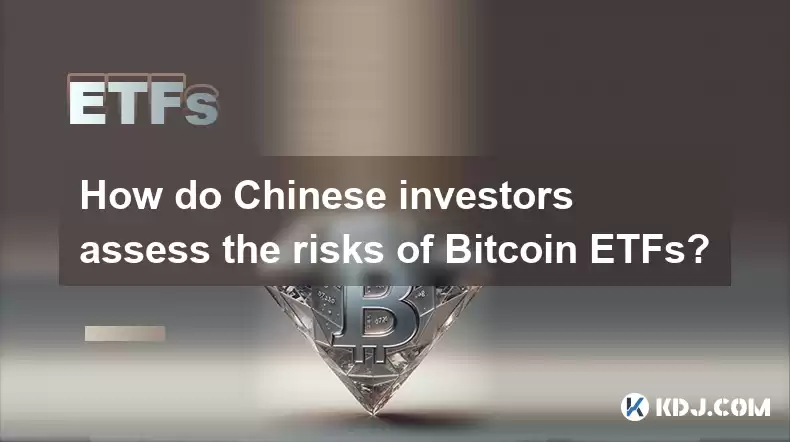
Understanding the Chinese Perspective on Bitcoin ETF Risks
Chinese investors, despite regulatory hurdles preventing direct investment in many cryptocurrencies, are increasingly sophisticated and globally aware. Their assessment of Bitcoin ETF risks differs from those in more established markets, primarily due to regulatory uncertainty and the unique geopolitical landscape. They must navigate a complex interplay of domestic regulations and international market dynamics. This necessitates a multi-faceted risk assessment that goes beyond simple price volatility.
Regulatory Uncertainty: A Primary Concern
The most significant risk for Chinese investors considering Bitcoin ETFs lies in the regulatory landscape. China has implemented strict bans on cryptocurrency trading and mining. While Bitcoin ETFs are traded on foreign exchanges, any investment in them carries the risk of future regulatory crackdowns impacting access or even the legality of holding such assets. This uncertainty creates a significant hurdle for potential investors. The potential for capital controls and restrictions on foreign currency transactions further compounds this risk.
Geopolitical Factors and Currency Fluctuations
Geopolitical tensions involving China also play a role. Any escalation of international conflicts could trigger market volatility impacting Bitcoin's price and, consequently, the value of Bitcoin ETFs. Moreover, the fluctuating value of the Chinese Yuan against the US dollar (or other currencies in which the ETF is denominated) introduces an additional layer of risk. Investors need to consider potential losses from currency exchange rate movements.
Market Volatility and Price Fluctuations
Bitcoin's inherent volatility is a major concern. While this is a risk for all Bitcoin investors, Chinese investors might have limited access to hedging strategies or diversified portfolios to mitigate these fluctuations. The lack of robust domestic regulatory oversight means fewer investor protections compared to more established markets. Understanding historical price volatility and its potential impact on investment returns is crucial.
Counterparty Risk and Exchange Stability
Investing in Bitcoin ETFs through international exchanges introduces counterparty risk. This refers to the risk that the exchange itself might fail or become insolvent, leading to the loss of invested funds. Chinese investors need to carefully vet the reputation and financial stability of the chosen exchange. They should also consider the jurisdictional challenges of pursuing legal recourse in case of exchange failure.
Information Asymmetry and Market Manipulation
Access to reliable and unbiased information about Bitcoin and the ETF market can be challenging for some Chinese investors. This information asymmetry increases the risk of making uninformed investment decisions. Furthermore, the possibility of market manipulation, though present globally, might be a more significant concern given the potential for less stringent oversight in certain jurisdictions.
Liquidity Risk and Transaction Costs
Liquidity risk, the risk of not being able to quickly sell an asset at its fair market value, is another factor. This is particularly relevant for less liquid ETFs or during periods of market stress. Additionally, transaction costs, including brokerage fees and exchange fees, can significantly eat into investment returns, especially for smaller investments. Chinese investors should carefully compare fees across different platforms.
Access and Investment Mechanisms
Accessing international exchanges and investing in Bitcoin ETFs requires navigating potentially complex procedures. This includes opening foreign brokerage accounts, transferring funds internationally, and understanding the tax implications in both China and the jurisdiction where the ETF is listed. The complexity of these processes adds another layer of risk.
How to Mitigate Risks
- Thorough Due Diligence: Carefully research the chosen Bitcoin ETF, the underlying assets, and the exchange offering it.
- Diversification: Don't put all your eggs in one basket. Diversify investments across different asset classes to reduce risk.
- Risk Tolerance Assessment: Understand your own risk tolerance before investing any significant amount.
- Stay Informed: Keep abreast of regulatory changes and market developments.
- Seek Professional Advice: Consult with a qualified financial advisor who understands both cryptocurrency and international investment regulations.
Frequently Asked Questions
Q: Are Bitcoin ETFs legal in China?
A: No, direct investment in cryptocurrencies, including Bitcoin, is currently prohibited in mainland China. Therefore, Bitcoin ETFs, even those listed on foreign exchanges, are not explicitly legal for direct investment by Chinese residents.
Q: What are the potential penalties for Chinese citizens investing in Bitcoin ETFs?
A: The penalties for violating China's cryptocurrency regulations can vary but may include fines, asset seizure, and even criminal prosecution. The specific penalties depend on the severity of the violation.
Q: How can Chinese investors access Bitcoin ETFs indirectly?
A: There are no officially sanctioned indirect methods. However, some investors might attempt to use virtual private networks (VPNs) or other methods to circumvent restrictions, though this carries significant legal and security risks.
Q: Are there any alternative investments for Chinese investors seeking exposure to the cryptocurrency market?
A: While direct investment in Bitcoin is prohibited, some investors might explore alternative strategies such as investing in companies involved in blockchain technology or cryptocurrency mining operations listed on overseas exchanges. However, these options also carry their own risks.
Q: How does the Chinese government's stance on cryptocurrency affect the risk assessment of Bitcoin ETFs?
A: The Chinese government's strict stance on cryptocurrencies significantly increases the risk associated with investing in Bitcoin ETFs for Chinese citizens. The potential for future regulatory crackdowns or changes in policy is a major concern.
Disclaimer:info@kdj.com
The information provided is not trading advice. kdj.com does not assume any responsibility for any investments made based on the information provided in this article. Cryptocurrencies are highly volatile and it is highly recommended that you invest with caution after thorough research!
If you believe that the content used on this website infringes your copyright, please contact us immediately (info@kdj.com) and we will delete it promptly.
- Tether Gold's Meteoric Rise: Market Cap and Soaring Gold Demand
- 2025-07-28 10:30:11
- Reddit, Crypto, and Altcoins: Navigating the Hype in 2025
- 2025-07-28 10:30:11
- Bitcoin, Altcoin, Volume Surge: Decoding the Crypto Market's Latest Moves
- 2025-07-28 10:50:20
- Bitcoin, Altcoins, and 2024 Targets: A NYC Perspective
- 2025-07-28 10:50:21
- Moo Deng Meme-Coin Mania: ROI or Just Hype?
- 2025-07-28 10:55:13
- Ethereum, Injective, and Tokenized Stock: A New Era in DeFi?
- 2025-07-28 11:10:12
Related knowledge
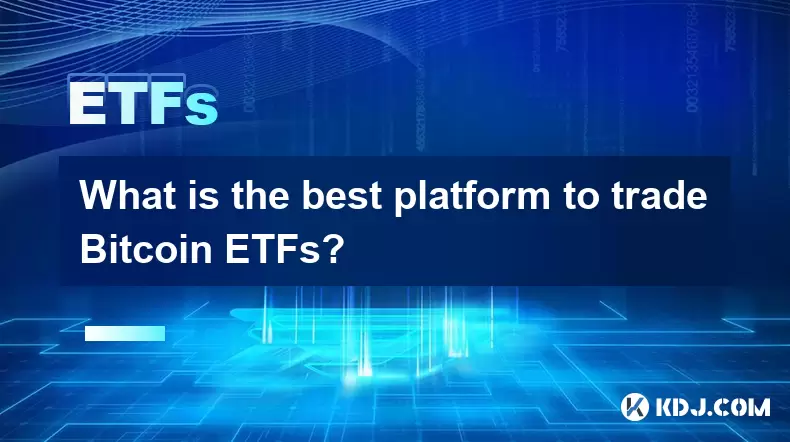
What is the best platform to trade Bitcoin ETFs?
Jul 23,2025 at 04:14am
Understanding Bitcoin ETFs and Their Role in TradingBitcoin Exchange-Traded Funds (ETFs) have gained significant traction among traditional and crypto...
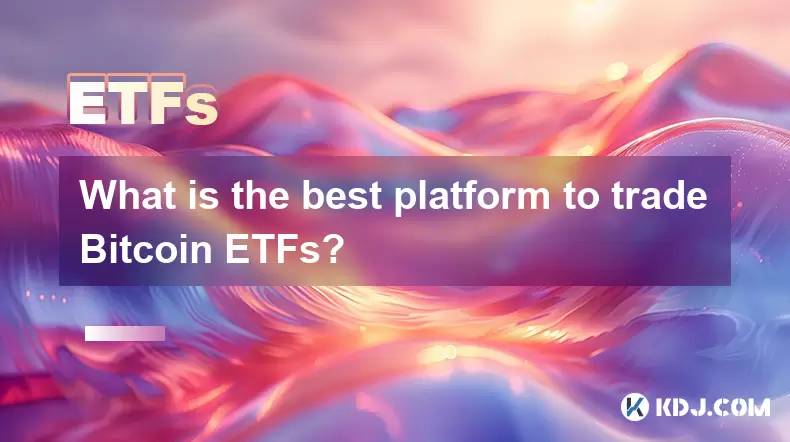
What is the best platform to trade Bitcoin ETFs?
Jul 17,2025 at 03:50pm
Understanding Bitcoin ETFs and Their Role in the MarketBitcoin Exchange-Traded Funds (ETFs) are investment vehicles that track the price of Bitcoin wi...
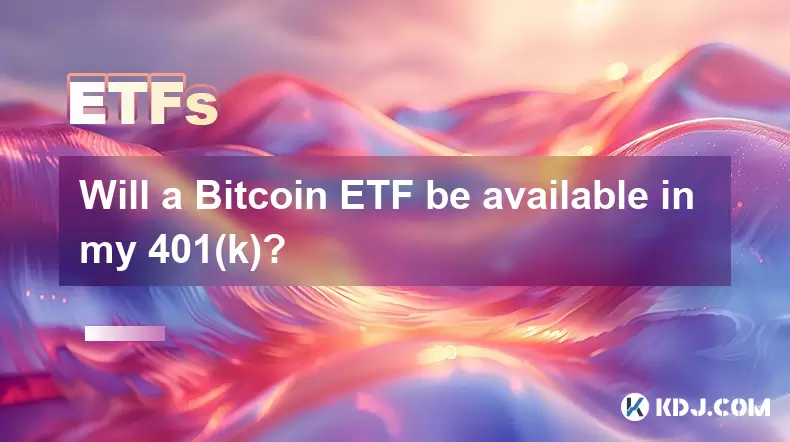
Will a Bitcoin ETF be available in my 401(k)?
Jul 17,2025 at 10:42pm
What is a Bitcoin ETF?A Bitcoin ETF (Exchange-Traded Fund) is an investment vehicle that tracks the price of Bitcoin without requiring investors to di...
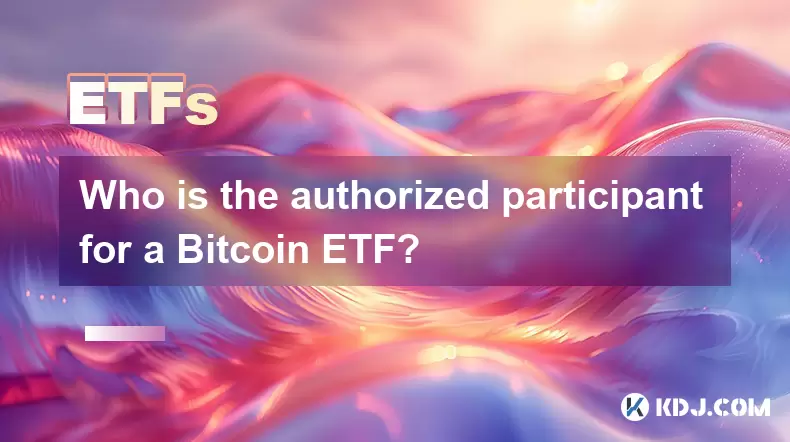
Who is the authorized participant for a Bitcoin ETF?
Jul 18,2025 at 12:42am
Understanding the Role of Authorized Participants in Bitcoin ETFsIn the context of Bitcoin Exchange-Traded Funds (ETFs), an authorized participant (AP...
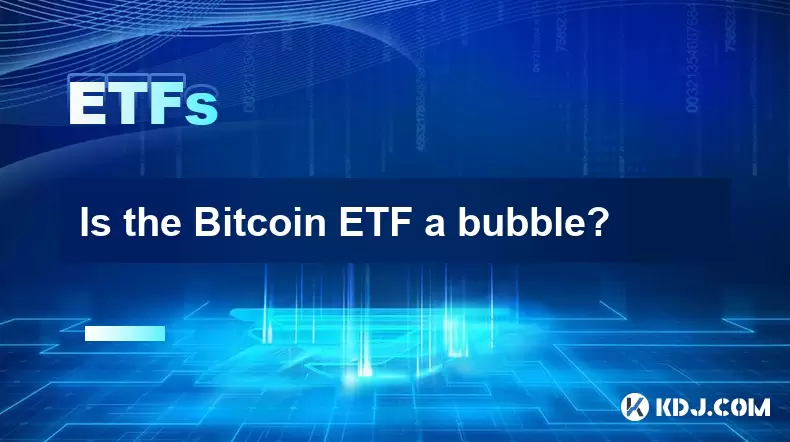
Is the Bitcoin ETF a bubble?
Jul 20,2025 at 06:57am
Understanding the Bitcoin ETF ConceptA Bitcoin Exchange-Traded Fund (ETF) is a financial product that aims to track the price of Bitcoin without requi...
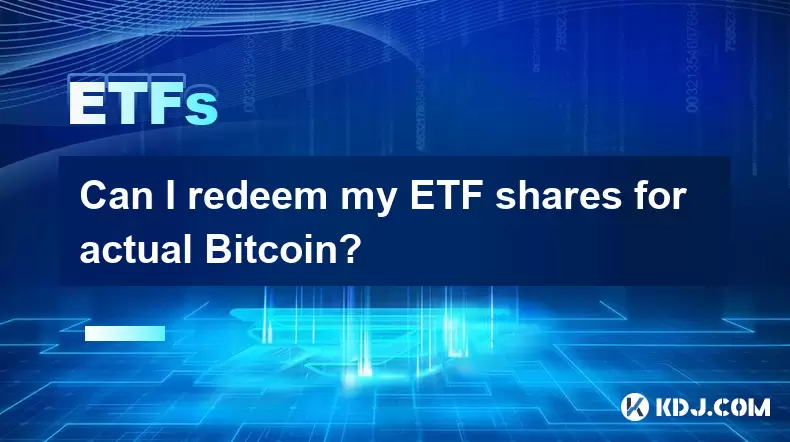
Can I redeem my ETF shares for actual Bitcoin?
Jul 17,2025 at 03:14pm
Understanding ETF Shares and Their Relation to BitcoinExchange-Traded Funds (ETFs) have become a popular investment vehicle for those looking to gain ...

What is the best platform to trade Bitcoin ETFs?
Jul 23,2025 at 04:14am
Understanding Bitcoin ETFs and Their Role in TradingBitcoin Exchange-Traded Funds (ETFs) have gained significant traction among traditional and crypto...

What is the best platform to trade Bitcoin ETFs?
Jul 17,2025 at 03:50pm
Understanding Bitcoin ETFs and Their Role in the MarketBitcoin Exchange-Traded Funds (ETFs) are investment vehicles that track the price of Bitcoin wi...

Will a Bitcoin ETF be available in my 401(k)?
Jul 17,2025 at 10:42pm
What is a Bitcoin ETF?A Bitcoin ETF (Exchange-Traded Fund) is an investment vehicle that tracks the price of Bitcoin without requiring investors to di...

Who is the authorized participant for a Bitcoin ETF?
Jul 18,2025 at 12:42am
Understanding the Role of Authorized Participants in Bitcoin ETFsIn the context of Bitcoin Exchange-Traded Funds (ETFs), an authorized participant (AP...

Is the Bitcoin ETF a bubble?
Jul 20,2025 at 06:57am
Understanding the Bitcoin ETF ConceptA Bitcoin Exchange-Traded Fund (ETF) is a financial product that aims to track the price of Bitcoin without requi...

Can I redeem my ETF shares for actual Bitcoin?
Jul 17,2025 at 03:14pm
Understanding ETF Shares and Their Relation to BitcoinExchange-Traded Funds (ETFs) have become a popular investment vehicle for those looking to gain ...
See all articles

























































































